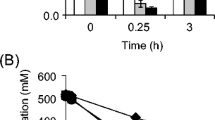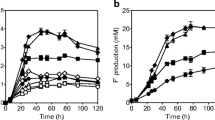Abstract.
The objective of this study was to evaluate the effect of extracellular H2 on organic acid utilization by two lactate-utilizing strains of Selenomonas ruminantium (HD4, H18). Both strains were able to grow (optical density at 600 nm ≥ after 9 h) on either aspartate, fumarate, or malate in the presence of 1 atmosphere (atm) of H2. Succinate was the major end product produced in these fermentations. When cells were incubated with lactate plus 1 atm H2, growth was minimal and little lactate was fermented. The electron transport inhibitor, acriflavine, was a strong inhibitor of growth when either strain was incubated in the presence of organic acid plus H2. Compared with glucose- or lactate-grown cells, cellular carbohydrate levels were lower for both strains in cells grown on either organic acid plus H2. These results suggest that electron transport plays a role in organic acid utilization by S. ruminantium.
Similar content being viewed by others
Author information
Authors and Affiliations
Rights and permissions
About this article
Cite this article
Martin, S., Park, CM. Effect of Extracellular Hydrogen on Organic Acid Utilization by the Ruminal Bacterium Selenomonas ruminantium . Curr Microbiol 32, 327–331 (1996). https://doi.org/10.1007/s002849900058
Issue Date:
DOI: https://doi.org/10.1007/s002849900058




